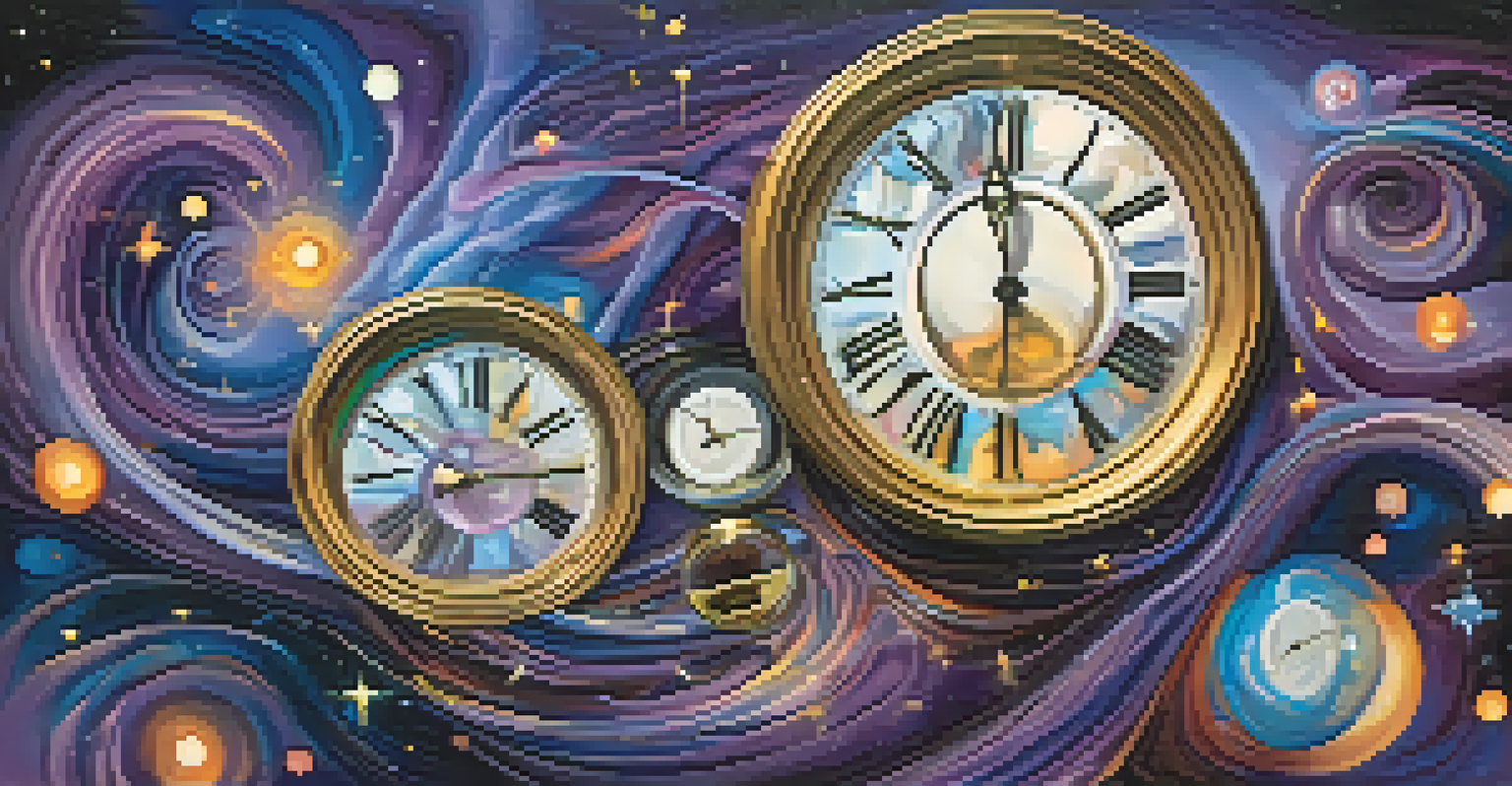Cognitive Shifts: Entheogens and the Nature of Temporal Flow

Understanding Entheogens and Their Role in Cognition
Entheogens are substances that can induce altered states of consciousness, often leading to profound insights and experiences. These compounds, such as psilocybin and ayahuasca, have been used for centuries in various cultures for spiritual and healing purposes. Recent research has begun to uncover how these substances can affect our cognitive processes, particularly in how we perceive time.
The experience of time during altered states of consciousness can profoundly reshape our understanding of reality.
When we consume entheogens, our brain undergoes significant changes, often leading to a distorted sense of temporal flow. For instance, many users report feeling as if time has slowed down or even stopped altogether. This alteration can lead to a heightened sense of awareness and a deeper understanding of one’s thoughts and emotions.
By studying these experiences, scientists are gaining insights into the nature of consciousness and how our brains construct the experience of time. Understanding this relationship can help us explore not just the effects of entheogens but also the very essence of our cognitive functioning.
The Science Behind Temporal Flow and Consciousness
Temporal flow refers to how we perceive the passage of time, and it can be highly subjective. Researchers have found that our perception of time can change based on various factors, including emotional states and cognitive load. This variability suggests that time is not a fixed entity but rather a construct shaped by our experiences.

Studies have shown that during altered states induced by entheogens, the brain's default mode network—responsible for self-referential thought—can become hyperactive. This hyperactivity may disrupt our usual timekeeping mechanisms, resulting in experiences where past, present, and future seem to merge. For example, someone might feel as if they are reliving past memories while simultaneously envisioning future possibilities.
Entheogens Alter Time Perception
Substances like psilocybin and ayahuasca can significantly distort our sense of time, leading to profound cognitive insights.
This phenomenon can lead to significant insights into our lives, as these cognitive shifts allow individuals to re-examine their relationships and priorities. Such experiences can foster a sense of clarity that often persists long after the effects of the substance have worn off.
Cultural Perspectives on Entheogens and Time Perception
Throughout history, various cultures have recognized the impact of entheogens on consciousness and temporal perception. Indigenous tribes in the Amazon, for instance, have long used ayahuasca as a means to connect with the spiritual realm, often describing experiences that transcend ordinary time. These cultural narratives provide a rich context for understanding how these substances can reshape our perception of reality.
Entheogens can help us confront the deepest aspects of ourselves, revealing insights that transcend ordinary perception.
In contrast, Western cultures have often approached entheogens with skepticism, viewing them primarily through the lens of addiction and mental health issues. However, emerging research suggests that these substances could offer therapeutic benefits, particularly in treating conditions like PTSD and anxiety, by changing the way individuals perceive and process time.
By examining these cultural perspectives, we can appreciate the diverse ways in which entheogens are utilized and understood. This understanding can enrich our dialogue around these substances and their potential to facilitate cognitive shifts in modern society.
Personal Experiences: Altered States and Temporal Insights
Many individuals who have experimented with entheogens report transformative experiences that profoundly alter their understanding of time and self. For example, someone might describe a journey where they felt connected to the universe, perceiving time as an infinite loop rather than a linear progression. This feeling can lead to a sense of peace and interconnectedness that is often described as life-changing.
These personal anecdotes illustrate how entheogens can provide a unique lens through which to examine our lives, relationships, and aspirations. The insights gained during these experiences can help individuals reframe past traumas or envision new futures, fostering personal growth and healing.
Cultural Views Shape Understanding
Different cultures perceive and utilize entheogens uniquely, impacting their acceptance and therapeutic potential in modern society.
While these experiences are subjective, they highlight the potential for entheogens to catalyze cognitive shifts that lead to lasting changes in perspective. Such transformations can inspire individuals to pursue paths aligned with their newfound understanding of time and existence.
The Therapeutic Potential of Entheogens in Modern Psychology
As research into the therapeutic uses of entheogens expands, psychologists are beginning to explore their potential to aid in mental health treatment. Studies have shown that substances like psilocybin can help patients confront deeply buried emotions, often leading to breakthroughs in therapy sessions. This process can be likened to rewiring one’s brain to approach issues from a fresh perspective.
The ability of entheogens to alter temporal perception may play a crucial role in this therapeutic potential. By helping patients step outside their usual temporal framework, these substances can facilitate a deeper exploration of emotions and experiences that might otherwise be too painful to confront. This shift can lead to greater emotional resilience and clarity.
Moreover, the growing acceptance of entheogens in therapeutic settings suggests a shift in societal attitudes toward mental health treatment. As we continue to unravel the complexities of time perception and cognition, entheogens may become an integral part of holistic healing practices.
Navigating the Risks and Benefits of Entheogen Use
While the potential benefits of entheogens are compelling, it’s essential to navigate their use with caution. Not everyone will have a positive experience, and for some, the psychological risks can be significant. It’s crucial to approach these substances in a safe and controlled environment, ideally with the guidance of trained professionals.
In addition to the risks, the context in which entheogens are consumed plays a vital role in shaping the experience. Factors such as setting, mindset, and the presence of supportive individuals can greatly influence outcomes. Understanding this context can help mitigate potential negative effects while enhancing the benefits of cognitive shifts.
Therapeutic Uses Are Expanding
Research into entheogens is revealing their potential benefits in mental health treatment, particularly for emotional healing and resilience.
Ultimately, the conversation around entheogen use must balance the exploration of their potential with an awareness of the risks involved. By fostering responsible use and promoting education, we can maximize the positive impacts while minimizing harm.
Future Directions: Research and Societal Implications
The landscape of entheogen research is rapidly evolving, with new studies emerging that explore their effects on cognition, emotional health, and temporal perception. As our understanding deepens, we may see a shift in public perception, leading to more widespread acceptance and integration of these substances into therapeutic practices.
Moreover, as we continue to explore the relationship between cognition and time, we may uncover new insights that challenge our traditional views of reality. This exploration could pave the way for innovative approaches to mental health and consciousness studies, potentially revolutionizing how we understand and treat psychological conditions.

Looking ahead, the societal implications of this research could be profound. By embracing the potential of entheogens, we might open doors to new forms of healing and understanding, fostering a culture that values introspection and emotional well-being.